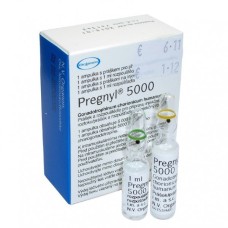HCG - (Human chorionic gonadotropin)
Characteristics:
Human chorionic gonadotropin is a glycoprotein hormone that is produced in women during pregnancy. Its main task is to prevent degradation of the corpus luteum in the ovary and thereby maintain progesterone secretion, the hormone important for a successful pregnancy. It has another very important functions for pregnancy: effects on immunity and reveals the rate of pregnancy (pregnancy defined by the levels of HCG).
Effects on the body:
HCG is a helper especially for women; it performs two key functions, induces ovulation and prevents the distribution of the corpus luteum in the ovary, which ensures percentage of pregnancy. In men, it is used to treat infertility by increasing the quantity of sperm in the testis. It can be used alone or in combination with a preparation containing FSH in case of under development of the gonads, delayed puberty, or a problem with the production of sperm. In some cases, administration of HCG in boys who have had the descent of one or both testicles.
HCG and sport support:
HCG and its use by athletes and bodybuilders in particular, is to increase testosterone levels. This hormone is essential for maintaining health, muscle mass and strength. With the decline inevitably you lose weight, strength and wellbeing. When is the decline risky? Especially at the end of steroid cycles, or upon discontinuation of doping substances. Therefore, it is appropriate to incorporate HCG into the PCT. Benefits of taking HCG:
- increase testosterone production
- increase spermatogenesis
- reduction of body fat
- improved sexual appetite
Dosage and administration:
In sports practice, there are two versions of the use of HCG:
- During a steroid cycle (fighting testicular atrophy)
- After the end of the cycle (starting testosterone production)
The available literature lists the dose of 2000 - 5000 IU every fifth day for 21 days. The application is implemented in two ways, either by intramuscular injection, or subcutaneous (under the skin). It is interesting that in the past HCG was used for adjunctive treatment of obesity in diabetics.
Possible negative effects:
Like other medicines, use of HCG entails certain risks. Most often these are gynecomastia, or pain and tenderness of the injection site. Men may experience increased water retention in the body (swollen ankles, or limbs).
Pregnyl HCG 5000IU
- Brand: Pharmacy Products
- Product Code: Pregnyl HCG 5000IU
- Availability: In Stock
-
$18.00
- Ex Tax: $18.00
.png)
